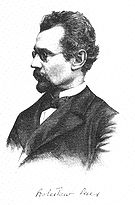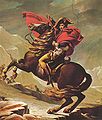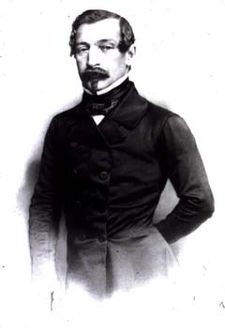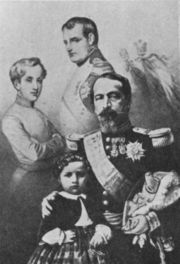.gif)
The Doll (novel)
Encyclopedia

Novel
A novel is a book of long narrative in literary prose. The genre has historical roots both in the fields of the medieval and early modern romance and in the tradition of the novella. The latter supplied the present generic term in the late 18th century....
s by the Polish
Poland
Poland , officially the Republic of Poland , is a country in Central Europe bordered by Germany to the west; the Czech Republic and Slovakia to the south; Ukraine, Belarus and Lithuania to the east; and the Baltic Sea and Kaliningrad Oblast, a Russian exclave, to the north...
writer Bolesław Prus. It was composed for periodical serial
Serial (literature)
In literature, a serial is a publishing format by which a single large work, most often a work of narrative fiction, is presented in contiguous installments—also known as numbers, parts, or fascicles—either issued as separate publications or appearing in sequential issues of a single periodical...
ization in 1887-89 and appeared in book
Book
A book is a set or collection of written, printed, illustrated, or blank sheets, made of hot lava, paper, parchment, or other materials, usually fastened together to hinge at one side. A single sheet within a book is called a leaf or leaflet, and each side of a leaf is called a page...
form in 1890.
The Doll has been regarded by some, including Nobel laureate Czesław Miłosz, as the greatest Polish novel. According to Prus biographer Zygmunt Szweykowski
Zygmunt Szweykowski
Zygmunt Szweykowski was a historian of Polish literature who specialized in 19th-century Polish prose.-Life:...
, it may be unique in 19th-century world literature
World literature
World literature refers to literature from all over the world, including African literature, American literature, Arabic literature, Asian literature, Australasian literature, Caribbean Literature, English literature, European literature, Indian literature, Latin American literature, Persian...
as a comprehensive, compelling picture of an entire society
Society
A society, or a human society, is a group of people related to each other through persistent relations, or a large social grouping sharing the same geographical or virtual territory, subject to the same political authority and dominant cultural expectations...
.
While The Doll takes its fortuitous title from a minor episode involving a stolen toy, readers commonly assume that it refers to the principal female character, the young aristocrat Izabela Łęcka. Prus had originally intended to name the book Three Generations.
The Doll has been translated
Translation
Translation is the communication of the meaning of a source-language text by means of an equivalent target-language text. Whereas interpreting undoubtedly antedates writing, translation began only after the appearance of written literature; there exist partial translations of the Sumerian Epic of...
into sixteen languages, and has been produced in several film
Film
A film, also called a movie or motion picture, is a series of still or moving images. It is produced by recording photographic images with cameras, or by creating images using animation techniques or visual effects...
versions and as a television miniseries.
Structure

Protagonist
A protagonist is the main character of a literary, theatrical, cinematic, or musical narrative, around whom the events of the narrative's plot revolve and with whom the audience is intended to most identify...
, Stanisław Wokulski, a man in early middle age. The other narrative, in the guise of a diary
Diary
A diary is a record with discrete entries arranged by date reporting on what has happened over the course of a day or other period. A personal diary may include a person's experiences, and/or thoughts or feelings, including comment on current events outside the writer's direct experience. Someone...
kept by Wokulski's older friend Ignacy Rzecki, takes the reader back to the 1848-49 "Spring of Nations."
Bolesław Prus wrote The Doll with such close attention to the physical detail of Warsaw
Warsaw
Warsaw is the capital and largest city of Poland. It is located on the Vistula River, roughly from the Baltic Sea and from the Carpathian Mountains. Its population in 2010 was estimated at 1,716,855 residents with a greater metropolitan area of 2,631,902 residents, making Warsaw the 10th most...
that it was possible, in the Interbellum, to precisely locate the very buildings where, fictively, Wokulski had lived and his store had been located on Krakowskie Przedmieście
Krakowskie Przedmiescie
Krakowskie Przedmieście is one of the most impressive and prestigious streets of Poland's capital.Several other Polish cities also have streets named Krakowskie Przedmieście. In Lublin, it is the main and most elegant street...
. Prus thus did for Warsaw
Warsaw
Warsaw is the capital and largest city of Poland. It is located on the Vistula River, roughly from the Baltic Sea and from the Carpathian Mountains. Its population in 2010 was estimated at 1,716,855 residents with a greater metropolitan area of 2,631,902 residents, making Warsaw the 10th most...
in The Doll in 1889 what James Joyce
James Joyce
James Augustine Aloysius Joyce was an Irish novelist and poet, considered to be one of the most influential writers in the modernist avant-garde of the early 20th century...
was famously to do for his own capital city
Capital City
Capital City was a television show produced by Euston Films which focused on the lives of investment bankers in London living and working on the corporate trading floor for the fictional international bank Shane-Longman....
, Dublin, in the novel Ulysses
Ulysses (novel)
Ulysses is a novel by the Irish author James Joyce. It was first serialised in parts in the American journal The Little Review from March 1918 to December 1920, and then published in its entirety by Sylvia Beach on 2 February 1922, in Paris. One of the most important works of Modernist literature,...
a third of a century later, in 1922.
Plot
Wokulski begins his career as a waiter at Hopfer's, a WarsawWarsaw
Warsaw is the capital and largest city of Poland. It is located on the Vistula River, roughly from the Baltic Sea and from the Carpathian Mountains. Its population in 2010 was estimated at 1,716,855 residents with a greater metropolitan area of 2,631,902 residents, making Warsaw the 10th most...
restaurant
Restaurant
A restaurant is an establishment which prepares and serves food and drink to customers in return for money. Meals are generally served and eaten on premises, but many restaurants also offer take-out and food delivery services...
. The scion of an impoverished Polish noble family dreams of a life in science
Science
Science is a systematic enterprise that builds and organizes knowledge in the form of testable explanations and predictions about the universe...
. After taking part in the failed 1863 Uprising
January Uprising
The January Uprising was an uprising in the former Polish-Lithuanian Commonwealth against the Russian Empire...
against Tsarist Russia, he is sentenced to exile in Siberia
Siberia
Siberia is an extensive region constituting almost all of Northern Asia. Comprising the central and eastern portion of the Russian Federation, it was part of the Soviet Union from its beginning, as its predecessor states, the Tsardom of Russia and the Russian Empire, conquered it during the 16th...
. On eventual return to Warsaw, he becomes a salesman at Mincel's haberdashery. Marrying the late owner's widow
Widow
A widow is a woman whose spouse has died, while a widower is a man whose spouse has died. The state of having lost one's spouse to death is termed widowhood or occasionally viduity. The adjective form is widowed...
(who eventually dies), he comes into money and uses it to set up a partnership with a Russia
Russia
Russia or , officially known as both Russia and the Russian Federation , is a country in northern Eurasia. It is a federal semi-presidential republic, comprising 83 federal subjects...
n merchant he had met while in exile. The two merchants go to Bulgaria
Bulgaria
Bulgaria , officially the Republic of Bulgaria , is a parliamentary democracy within a unitary constitutional republic in Southeast Europe. The country borders Romania to the north, Serbia and Macedonia to the west, Greece and Turkey to the south, as well as the Black Sea to the east...
during the Russo-Turkish War of 1877-78, and Wokulski makes a fortune supplying the Russian Army.
The enterprising Wokulski now proves a romantic at heart, falling in love with Izabela, daughter of the vacuous, bankrupt aristocrat, Tomasz Łęcki.


Europe
Europe is, by convention, one of the world's seven continents. Comprising the westernmost peninsula of Eurasia, Europe is generally 'divided' from Asia to its east by the watershed divides of the Ural and Caucasus Mountains, the Ural River, the Caspian and Black Seas, and the waterways connecting...
. Through his diary the reader learns about some of Wokulski's adventures, seen through the eyes of an admirer. Rzecki and his friend Katz had gone to Hungary
Hungary
Hungary , officially the Republic of Hungary , is a landlocked country in Central Europe. It is situated in the Carpathian Basin and is bordered by Slovakia to the north, Ukraine and Romania to the east, Serbia and Croatia to the south, Slovenia to the southwest and Austria to the west. The...
in 1848 to enlist in the revolutionary army. For Rzecki, the cause of freedom in Europe is connected with the name of Napoleon Bonaparte, and the Hungarian revolution had sparked new hopes of abolishing the reactionary
Reactionary
The term reactionary refers to viewpoints that seek to return to a previous state in a society. The term is meant to describe one end of a political spectrum whose opposite pole is "radical". While it has not been generally considered a term of praise it has been adopted as a self-description by...
system that had triumphed at Napoleon's fall. Later he had reposed his hopes in Napoleon III. Now, as he writes, he places them in Bonaparte's scion, Napoleon III's son, Prince Loulou. At novel's end, when Rzecki hears that Loulou has perished in Africa
Africa
Africa is the world's second largest and second most populous continent, after Asia. At about 30.2 million km² including adjacent islands, it covers 6% of the Earth's total surface area and 20.4% of the total land area...
, fighting in British
Great Britain
Great Britain or Britain is an island situated to the northwest of Continental Europe. It is the ninth largest island in the world, and the largest European island, as well as the largest of the British Isles...
ranks against rebel tribesmen, he will be overcome by the despondence of old age.

Politics
Politics is a process by which groups of people make collective decisions. The term is generally applied to the art or science of running governmental or state affairs, including behavior within civil governments, but also applies to institutions, fields, and special interest groups such as the...
, which he refers to in his diary by the code-letter
Code
A code is a rule for converting a piece of information into another form or representation , not necessarily of the same type....
"P." Everywhere in the press he finds indications that a long-awaited "it" is beginning.
In addition to the two generations represented by Rzecki and Wokulski, the novel provides glimpses of a third, younger one, exemplified in the scientist Julian Ochocki (modeled on Prus' friend, Julian Ochorowicz
Julian Ochorowicz
Julian Leopold Ochorowicz was a Polish philosopher, psychologist, inventor , poet, publicist and leading exponent of Polish Positivism.-Life:Julian Ochorowicz was the son of Julian and Jadwiga, née...
), some students, and young salesmen at Wokulski's store. The half-starving student
Student
A student is a learner, or someone who attends an educational institution. In some nations, the English term is reserved for those who attend university, while a schoolchild under the age of eighteen is called a pupil in English...
s inhabit the garret of an apartment house and are in constant conflict with the landlord over their arrears
Arrears
Arrears is a legal term for the part of a debt that is overdue after missing one or more required payments. The amount of the arrears is the amount accrued from the date on which the first missed payment was due...
of rent; they are rebels, are inclined to macabre pranks, and are probably socialists. Also of socialist persuasion is a young salesman, whereas some of the latter's colleagues believe first and last in personal gain
Profit (economics)
In economics, the term profit has two related but distinct meanings. Normal profit represents the total opportunity costs of a venture to an entrepreneur or investor, whilst economic profit In economics, the term profit has two related but distinct meanings. Normal profit represents the total...
.
The Dolls plot focuses on Wokulski's infatuation with the superficial Izabela, who sees him only as a plebeian intruder into her rarefied world, a brute with huge red hands; for her, persons below the social standing of aristocrat
Aristocracy (class)
The aristocracy are people considered to be in the highest social class in a society which has or once had a political system of Aristocracy. Aristocrats possess hereditary titles granted by a monarch, which once granted them feudal or legal privileges, or deriving, as in Ancient Greece and India,...
s are hardly human.
Wokulski, in his quest to win Izabela, begins frequenting theaters and aristocratic salons; and, to help her financially distressed father, founds a company and sets the aristocrats up as shareholder
Shareholder
A shareholder or stockholder is an individual or institution that legally owns one or more shares of stock in a public or private corporation. Shareholders own the stock, but not the corporation itself ....
s in the business.
Wokulski's eventual downfall highlights The Dolls overarching theme: the inertia
Inertia
Inertia is the resistance of any physical object to a change in its state of motion or rest, or the tendency of an object to resist any change in its motion. It is proportional to an object's mass. The principle of inertia is one of the fundamental principles of classical physics which are used to...
of Polish society
Society
A society, or a human society, is a group of people related to each other through persistent relations, or a large social grouping sharing the same geographical or virtual territory, subject to the same political authority and dominant cultural expectations...
.
Alter egos
Wokulski and Rzecki are in many ways alter egoAlter ego
An alter ego is a second self, which is believe to be distinct from a person's normal or original personality. The term was coined in the early nineteenth century when dissociative identity disorder was first described by psychologists...
s for the book's author. The frustrated scientist
Scientist
A scientist in a broad sense is one engaging in a systematic activity to acquire knowledge. In a more restricted sense, a scientist is an individual who uses the scientific method. The person may be an expert in one or more areas of science. This article focuses on the more restricted use of the word...
Wokulski is created in Prus' own image. During a visit to Paris
Paris
Paris is the capital and largest city in France, situated on the river Seine, in northern France, at the heart of the Île-de-France region...
, Wokulski meets an old scientist named Geist (whose name is German
German language
German is a West Germanic language, related to and classified alongside English and Dutch. With an estimated 90 – 98 million native speakers, German is one of the world's major languages and is the most widely-spoken first language in the European Union....
for "Spirit"), who is trying to discover a metal
Metal
A metal , is an element, compound, or alloy that is a good conductor of both electricity and heat. Metals are usually malleable and shiny, that is they reflect most of incident light...
lighter than air; in the hands of those who would use it to organize mankind, it could bring universal peace
Peace
Peace is a state of harmony characterized by the lack of violent conflict. Commonly understood as the absence of hostility, peace also suggests the existence of healthy or newly healed interpersonal or international relationships, prosperity in matters of social or economic welfare, the...
and happiness
Happiness
Happiness is a mental state of well-being characterized by positive emotions ranging from contentment to intense joy. A variety of biological, psychological, religious, and philosophical approaches have striven to define happiness and identify its sources....
. Wokulski is torn between his misplaced, tragic love for Izabela and the idea of settling in Paris and using his fortune to perfect Geist's invention.
The Doll, rich in characters and observations from everyday Warsaw
Warsaw
Warsaw is the capital and largest city of Poland. It is located on the Vistula River, roughly from the Baltic Sea and from the Carpathian Mountains. Its population in 2010 was estimated at 1,716,855 residents with a greater metropolitan area of 2,631,902 residents, making Warsaw the 10th most...
life, in Czesław Miłosz's opinion embodies 19th-century realistic prose
Literary realism
Literary realism most often refers to the trend, beginning with certain works of nineteenth-century French literature and extending to late-nineteenth- and early-twentieth-century authors in various countries, towards depictions of contemporary life and society "as they were." In the spirit of...
at its best. It brings its protagonist to a full awareness of the chasm that stretches between his dreams and the social reality that surrounds him.
Translations
The Doll has been translatedTranslation
Translation is the communication of the meaning of a source-language text by means of an equivalent target-language text. Whereas interpreting undoubtedly antedates writing, translation began only after the appearance of written literature; there exist partial translations of the Sumerian Epic of...
into seventeen languages: Bulgarian, Czech, English, Estonian, French, Georgian, German, Hungarian, Italian, Latvian, Lithuanian, Romanian, Russian, Serbo-Croatian, Slovak, Slovenian, Ukrainian.
Films
- 1968: Lalka, The Doll (1968 film)The Doll (1968 film)The Doll is a 1968 Polish film directed by Wojciech Jerzy Has. The Doll is an adaptation of the novel, The Doll by Bolesław Prus, which is regarded by many as one of the finest Polish novels ever written and, along with Pharaoh , made Bolesław Prus a potential candidate for the Nobel Prize in...
, directed by Wojciech Has - 1978: Lalka, directed by Ryszard Ber

